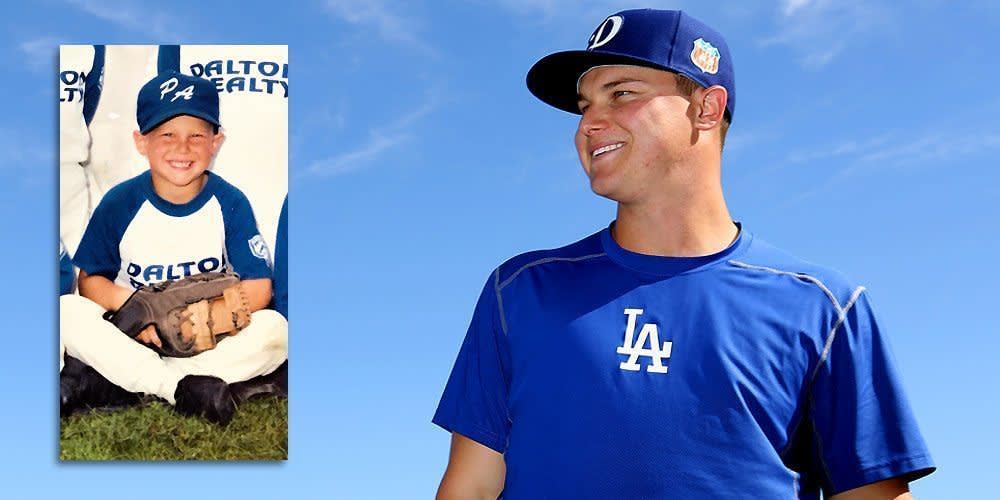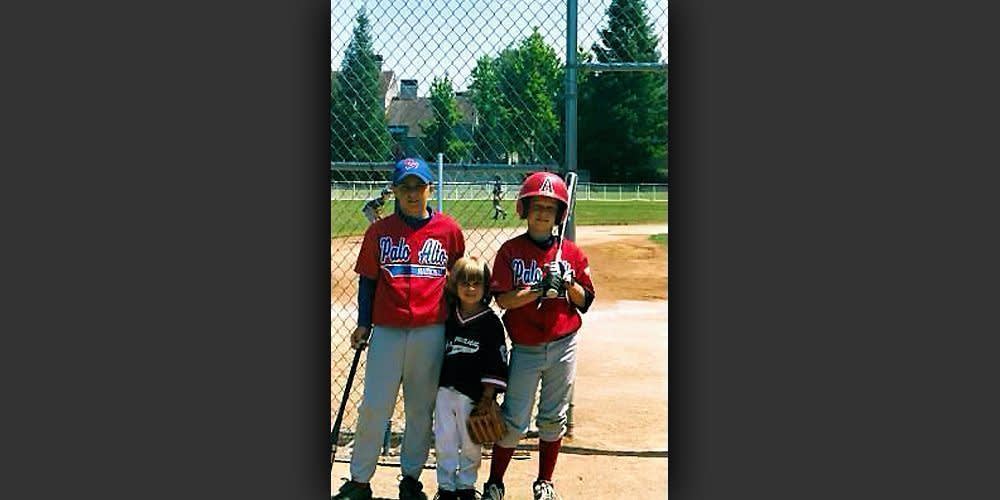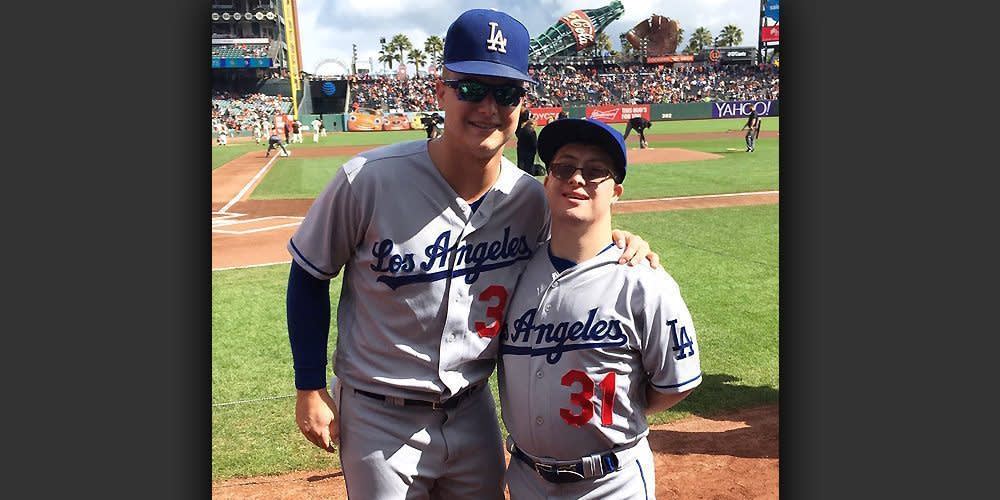
Stu Pederson, father of Los Angeles Dodger’s standout centerfielder, Joc Pederson, has coached baseball at many levels, from Little League® to high school to a college summer baseball team in Alaska. In all of that experience, there’s one word he has never said to any of his players (it starts with a “W”).
Stu and his son, Joc, share more than just a deep love for baseball. Stu was selected in the ninth round of the 1981 Major League Baseball (MLB) draft by the same team his son now stars on. While the father never reached the professional heights of his son, it can be argued with a great deal of certainty that if it wasn’t for the baseball teachings of Stu, Joc would not be where he is today. He and his wife Shelly raised four Little Leaguers® who have all gone on to great accomplishments as young adults – in baseball for Joc and his older brother, Tyger; soccer for daughter, Jacey; and for their eldest, Champ, who has Down syndrome, through his motivational and awareness efforts.
Little League recently sat down with Stu to discuss his own Little League days, how Little League was a big part of his entire family, the role parents should play in Little League, the importance of the Little League Challenger Division®, and yes, that one word no Little League coach should ever say.
Little League – All of your children played Little League, did you?
Stu Pederson – I played in the Sunnyville Metro Little League in Sunnyville, California. It was a lot of fun, and I made a lot of friends. The great thing about Little League is that you play with kids you know from your neighborhood. When I played, it was before travel ball. Travel ball today doesn’t make sense to me. There’s too much pressure on kids to get championships, it’s too costly, and kids are overbooked. I’d much rather have kids play with kids they know where families know families. That’s fun.
LL – Your kids all played in the Palo Alto Little League. What is Little League like in Palo Alto?
SP – There is a lot of community support. When my kids played, there were a ton of families involved. We always had a barbeque after every Saturday game. Everyone in the league would be there. The kids were more excited about what they were going to be eating after the game, and hanging out with their friends, than their own game.
LL – What is your favorite Little League memory from when your children played?
SP – There are so many. I think the main one is just seeing all of my boys together. Champ is 29, Tyger is 27, and Joc is 24, so they were all around at the same time. My daughter, Jacey, is 18, and she had a great Little League experience, too. Jacey played baseball. Little League was a big part of our family.

LL – Did you coach in the Palo Alto Little League?
SP – I coached all of my boys from after Tee Ball through their 12-year-old seasons. My wife coached Jacey in Tee Ball.
LL – What was your Little League coaching style like?
SP – As I coach, I had three rules: Be on time, give one-hundred percent, be a good teammate. I will tell you that in all of my years coaching Little League, I never said the word “Win” to any of my players. I emphasized having fun, and to do the best they can. All my players knew that I didn’t care about wins, strikeouts, or missed groundballs. Baseball is all about development, and I don’t just mean within the sport. Baseball gives the opportunity to learn the lessons that will help through life – working hard, being accountable, being on time, being a good teammate. One day, these kids will be out in the real world, getting a real job, and these lessons will help them.
LL – You really never said the word “Win” to any player?
SP – It’s just not important to me as a Little League coach. As a player, sure, it was important. I am a competitive person. I wanted to win as a player. But, winning should never, ever be a focus in Little League. As a matter of fact, when I sat on the Board at Palo Alto, the League President would go around the room, and ask each Board member for ideas on what he or she would do if they were the League President. My answer was: Don’t keep score. Let’s just have fun and develop kids.
LL – Can you give a specific example of how you coached to develop and not win?
SP – I never pitched a kid more than three innings in a week. I didn’t care if they were a great pitcher, that’s all they were going to throw. My teams always used seven to nine pitchers. If a kid wanted to pitch, he was going to pitch. My only rule was that they had to go through some pitching practice. I wasn’t going to throw just a few pitchers in order to get wins.
LL – What role do you think parents should play during a Little League game?
SP – Either help coach or sit in the stands, watch your kid, and support them. Do not coach from the stands. I never tolerated that. Kids have a tough enough time trying to do the best they can. They don’t need a parent on them from the stands. Let the coaches coach.
LL – When you were coaching Joc, was there a particular time when you just knew he had something special?
SP – Not really. He just loved baseball. Even in kindergarten when he had half-days at school, he would ask me to take him to the high school where I was coaching. I would do soft toss, and grounders with him. People always ask me how many homeruns Joc hit in Little League. He didn’t hit one. At 12 years old, Joc was only 5’0” and 105 pounds. At 14, he was only 5’4” and 120 pounds. I told him that he’ll eventually grow, and with his skillset, he has the potential to do something great. I told him it’s much more important to hit right, than to hit far. He hit his first homerun at 17. (Note: At the 2015 MLB Home Run Derby, Joc finished second to another Little League grad, Todd Frazier.)

LL – While Joc is having a great career with the Dodgers, Tyger played in college and in the minors, and Jacey is a national standout soccer player, Champ may very well be the star of the family.
SP – Champ has Down Syndrome, but that hasn’t stopped him from being successful. He has a line of clothing, and hats (through New Era Cap) at LiveLikeAChamp.com, and has given motivational speeches throughout the country. As a matter of fact, for Game 5 versus the Mets this year, the Dodgers brought in Champ to speak to the team.
LL – Did Champ play Challenger baseball at Palo Alto Little League?
SP – He did, and it was great! The Challenger program is an important part of Little League. If there’s one thing parents and Little League kids should do is go watch a Challenger game. All the kids care about is having fun and being with other kids. They don’t care about winning. Tyger, Joc, and Jacey were all part of the Challenger program, helping on the field, supporting Champ and his teammates. The joy, smiles, happiness at Challenger games is unbelievable!